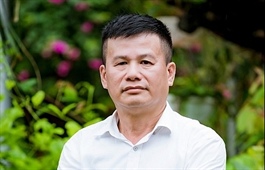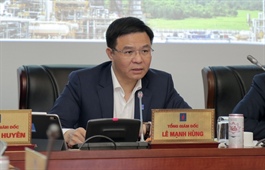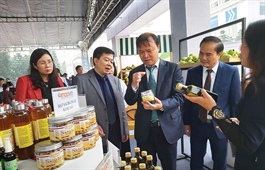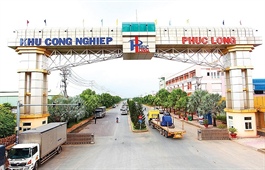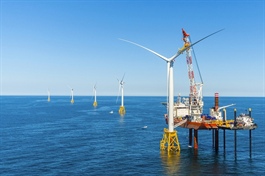Widening prospects via Japan-US energy deals
Widening prospects via Japan-US energy deals
Leaders of Japan and the US launched the Japan-US Strategic Energy Partnership (JUSEP) in 2017. Its core principles are that open and competitive energy markets are indispensable to ensuring secure energy supply; and universal access to affordable and reliable energy is needed to help eradicate poverty, fuel economic growth, and increase global security.
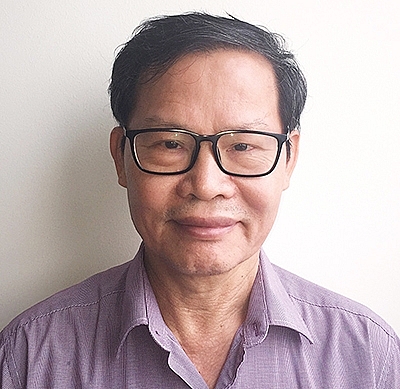
Nguyen Thanh Ha - Vietbid Consulting Co., Ltd
|
Priorities for JUSEP’s work plan meanwhile include development of a global market for natural gas, and energy infrastructure development in the likes of South and Southeast Asia as well as Sub-Saharan Africa that promotes regional integration, adheres to principles of good governance and transparency, and expands access to the global energy market.
In a Japan-US joint statement on advancing a free and open Indo-Pacific through energy, infrastructure and digital connectivity cooperation in 2018, Japan expressed its intention to facilitate high-standard investment in projects to supply liquefied natural gas (LNG) or build LNG infrastructure by aligning the Japanese government’s target of $10 billion in public and private finance and capacity building training with the US’ Asia EDGE initiative.
Japan announced in September 2019 that it intends to increase its public and private finance by another $10 billion and enhance capacity building training, which we believe will further promote joint and collaborative activities between the US and Japan by facilitating financing for projects to supply LNG or build LNG infrastructure in the Indo-Pacific region.
This Japanese public finance facility includes support from the Japan Bank for International Cooperation, the Nippon Export and Investment Insurance (NEXI), and the Japan Oil, Gas and Metals National Corporation.
There are also available public finance options from the US, namely from the International Development Finance Corporation and the Export-Import Bank of the United States (EXIM).
In addition, EXIM and NEXI intend to sign a reinsurance and co-financing agreement that will significantly enhance the opportunities for joint US-Japan financing and cooperation.
Boosted LNG cooperation
Vietnam will need huge demand for power in the next 10-15 years. Because domestic coal and hydro power are no longer available for new power generation projects, and domestic natural gas also has limitations, Vietnam would need to rely more and more on renewable energy and import LNG.
The Ministry of Industry and Trade is assigned by the prime minister to prepare the Power Development Master Plan VIII for the 2021-2030 period, with vision to 2045, which will specify the total power generation from LNG. While waiting for that, there has been some calculation that the new total power generation from LNG by 2030 would amount to more than 12,000MW.
Vietnam can buy LNG from different sources, including near-neighbours like Indonesia, Malaysia, and Australia. However, buying from the US is an option partly because the US government has changed its energy policy. Before 2016, the US restricted the export of its natural gas, and imported gas from Canada so as to maintain its energy security.
However, from 2016, the government allowed LNG export, and it quickly reached 59 billion cubic metres in 2019. LNG for export from the US is now more abundant and more easily accessible.
In this context, it would be good for Vietnam and the US, both from the government and private sector, to work towards powering projects with LNG supply from the US, or simply LNG procurement from the US. In fact, many US companies such as AES, ExxonMobil, Gen X, and General Electric (GE) have been actively pursuing such business in Vietnam.
Tri-partite agreements
It is not a surprise to know that while the US has abundant supply of LNG, as well as great engineering and technical expertise, it has some limitations in terms of investment. Thus, while many US companies may act as fuel and equipment suppliers, as well as engineering contractors, there is still a need to find investors.
This is where Japan can come in. As mentioned, the Japanese government is keen to provide support to this kind of energy projects. Japanese companies have extensive experience in LNG import, transport, construction and operation of LNG-fuelled power plants.
In fact, Japan is the biggest importer of LNG in the world, with 85 billion cu.m in 2019, compared to South Korea (28 billion cu.m) and China (26 billion cu.m). Therefore, a tri-partite cooperation between a Vietnamese entity with a Japanese and a US entity would capitalise on resources and capability of both Japan and the US.
Some examples are taking place here. For Long Son LNG to power its project, Mitsubishi and GE joined a consortium with local companies including Genco3 to bid to become investors in the scheme. Just over a week ago JERA, one of the biggest operators of the LNG business in Japan, signed an MoU with ExxonMobil for development of a LNG-to-power project in Haiphong.
It may be time that government authorities, together with business communities from the three countries, should seriously explore and discuss tri-partite cooperation, and come up with specific action plans satisfactory for all three countries.








